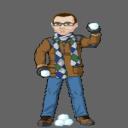Yahoo Answers is shutting down on May 4th, 2021 (Eastern Time) and beginning April 20th, 2021 (Eastern Time) the Yahoo Answers website will be in read-only mode. There will be no changes to other Yahoo properties or services, or your Yahoo account. You can find more information about the Yahoo Answers shutdown and how to download your data on this help page.
Trending News
Good contemporary novelists?
The other day, I asked if it is good to use" me" instead of "my" as it is used in the novel I am reading. However, most of the replies were in negative. Since then, I am sceptical about the standard of this author's writing. It is a novel called "Faceless" by Martina Cole. Please tell me about the author's credibility in literary circle. Further, suggest me few names of contemporary (American/ Britin in particular) novelist and their best sellers. I like to read Sydney Sheldon, Dan Brown and Daniel Steel. I love fiction and thriller novels like Bloodline by Sheldon, Da Vinci Code and Deception point etc. Remember English is not my native language , I am from Pakistan and trying to learn this language.
1 Answer
- Patrick RLv 51 decade agoFavorite Answer
I was completely ignorant of Martina Cole. I just had a look at her writing and subject matter. As it turns out, she seems to write much better than most "popular" novelists. She is certainly ten times better than Dan Brown, whose writing is actually very bad, no matter how good his imagination is.
The reason for the substitution of "me" for "my" in Martina Cole's dialogue is that many of her characters are from the East End of London. She is simply mimicking their way of speaking, which typically among working class folk in the East End (and in some other dialects in England and the rest of Great Britain), uses "me" to mean "my." For example, "I took me coat because it was so cold" or "Let me eat me breakfast, and then we can go." Cole could actually have made the dialogue even more accurate with many more changes in spelling, but she very wisely uses a minimal amount of such changes to lend authenticity to the dialogue.
Please remember that she is a British author. There are many more dialects in Britain than there are in the U.S., oddly enough. So if you continue to read books written by English or, more widely, British authors, you will encounter many more dialects. Irvine Welsh and James Kelman are two good examples of authors whose work people sometimes find unbearable to read (esp. Irvine Welsh) because the dialogue or first-person narration is much too accurate in reproducing actual dialect.
I am sorry that I can't really recommend authors to you. I don't usually read the sorts of books you like. However, you certainly might like Agatha Christie or Robertson Davies, both of whom are rather straightforward but imaginative writers.
Take care....


